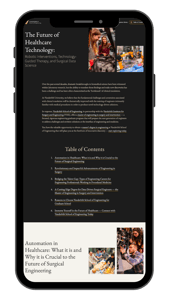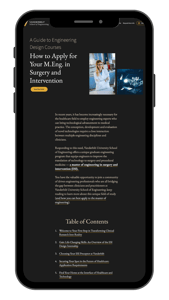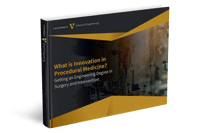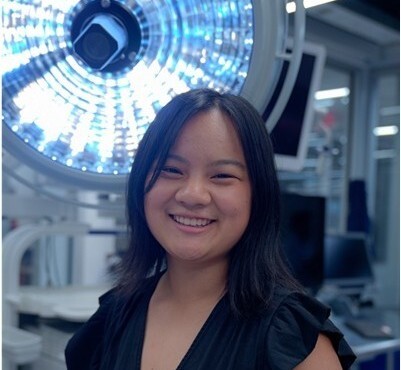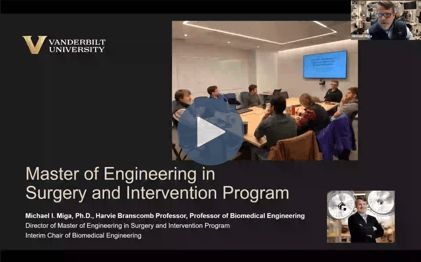Transform Procedural Medicine with a
Master of Engineering in
Surgery and Intervention
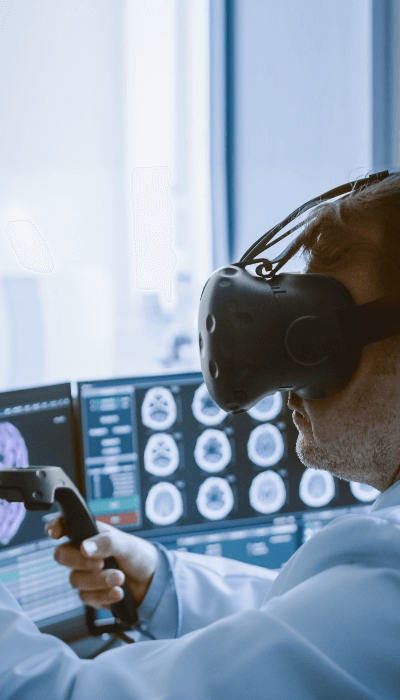
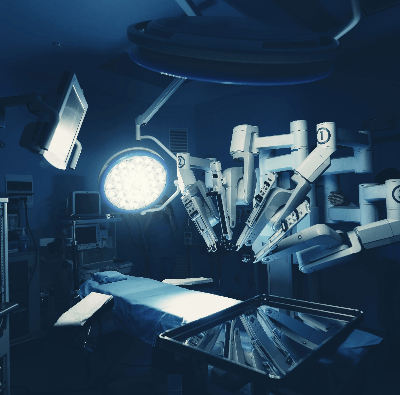
Over the past several decades, laboratory research has accomplished dramatic breakthroughs in biomedical science, but the ability to translate those findings and make new discoveries remains a challenge and is often characterized as the bottleneck of clinical translation.
In response to this need, Vanderbilt University School of Engineering, in partnership with the Vanderbilt Institute for Surgery and Engineering (VISE), launched a master of engineering in surgery and intervention — a specialized, rigorous engineering graduate program that will prepare the next generation of engineers to address challenges and envision solutions at the interface of engineering and medicine.
Ready to learn more about this degree?
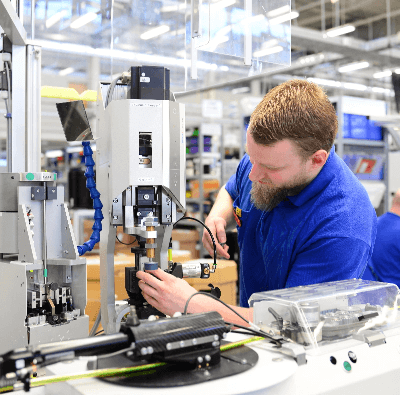
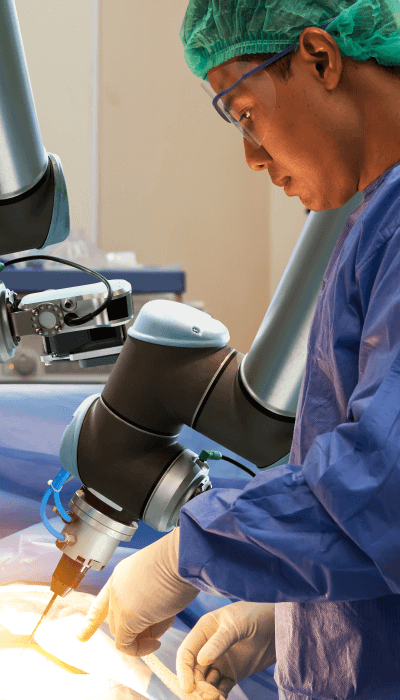
The Future of Healthcare Technology:
Robotic Interventions, Technology-Guided Therapy,
and Artificial Intelligence
Healthcare professionals today, and specifically surgeons, are experiencing the benefits of technological advancements that are developed by surgical engineering professionals who have harnessed the power of automation and data to augment healthcare procedures and services. Learn more about these technological advances and what it could mean for your future career in our informative digital resource.
A Guide to Engineering Design Courses:
How to Apply for Your M.Eng. in
Surgery and Intervention
In recent years, it has become increasingly necessary for the healthcare field to employ engineering experts who can bring technological advancement to medical practice. The conception, development and evaluation of novel technologies require a close interaction between multiple engineering disciplines and clinicians. Keep reading to learn more about this unique field of study (and how you can best apply to the master of engineering).
Discover your career path in surgical engineering and healthcare innovation
The Master of Engineering in Surgery and Intervention is tailor-made for engineers and clinical professionals alike to drive forward technological progress and innovation within medicine.
Other Media
Download Our Free eBook
At Vanderbilt School of Engineering, we believe in increasing innovation in procedural medicine.
Read Our Most Recent Blogs
Looking for additional opportunities to explore the field? Check out some of our most popular blog posts:
Watch Our Short Video
Watch our short video above to find out why Vanderbilt University’s master of engineering in surgery and intervention is one of the most cutting-edge engineering degrees today.
View the Recorded Webinar
Watch the recorded webinar to gain valuable insights from the program director, grasp the program's core essence, and chart your path towards innovative excellence.
Careers in Engineering for Surgery and Intervention:
Panel I
Explore careers at the enterprise level with Stephen Aylward, PhD, Senior Director of Strategic Initiatives at Kitware, Inc. (now Global Developer Relations Manager for Medical Technologies at NVIDIA) and Jing Zhao, PhD, Senior Principle Analytics Tech Lead – Surgical Robotics at Medtronic.
Vanderbilt’s Entrepreneurial Ecosystem:
Panel III
Understand Vanderbilt’s entrepreneurial ecosystem with Charleson Bell, PhD, Director of Entrepreneurship, Biomedical Innovation, and I-Corps at Vanderbilt’s Wond’ry and Mr. George Wilson who is the New Ventures Officer at Vanderbilt University’s Center for Technology Transfer and Commercialization.
Digital Twins, Sensing, and Next Generation Devices:
Panel V
Whereas in the past, fundamental discoveries were made at the bench in preclinical systems, today’s discoveries arise out of human data and within the context of imaging, electronic health records, and interventions in human systems. In this panel, we will consider the digital twin as a model of discovery, some aspects of sensing devices that are providing new dimensions to data, and finally, a look at the next generational devices.
Frontiers in AI for Surgery and Intervention:
Panel VII
Watch as we delve into the ground-breaking impact of Artificial Intelligence (AI) on surgery and intervention. Our expert panelists will share insights on the latest breakthroughs, hurdles, and the future potential of AI in transforming surgical procedures. From intelligent surgical robotics and real-time decision-making assistance to personalized therapeutic delivery and predictive patient outcomes, AI is set to redefine patient care and the future of procedural medicine. Don't miss this unique opportunity to listen-in on a conversation with two pioneers at the forefront of this fascinating field.
Careers in Engineering for Surgery and Intervention:
Panel II
Discover the fast-paced and kinetic world of the entrepreneur with Piotr Slawinksi, PhD, Technical Lead, Robotics and Controls at the startup Noah Medical, and Jim Stefansic, PhD, Director of Corporate Development at Cumberland Emerging Technologies.
Vanderbilt Entrepreneurs:
Panel IV
Hear from two Vanderbilt entrepreneurs well on their way to realizing a vision for 21st century robotic surgery in their cutting-edge company Virtuoso Surgical, Inc. Dr. Duke Herrell III, MD and Dr. Robert Webster III, PhD are the esteemed presenters during this panel discussion.
Cutting-Edge Interventional Technologies for Challenges in Global Health: Panel VI
Throughout our series of panels, a common thread has been the notion that our designs are boundless and unfettered by the limitations of practical implementation and the constraints of the presenting environment. In this discussion, however, we shift focus to the distinct challenge of creating designs within restricted settings as we delve into pioneering interventional technologies aimed at addressing global health issues.
Frontiers in Pathology-enabled Surgical Guidance for Cancer: Panel VIII
Advancements in pathology-enabled surgical guidance are transforming cancer care with greater precision and personalization. Cutting-edge tools like augmented reality (AR), real-time imaging, and advanced image fusion now give surgeons 3D holographic views and accurate tracking of disease progression. These innovations enhance surgical accuracy, improve treatment planning, and ultimately lead to better outcomes. Join us to explore how these breakthroughs are reshaping surgical oncology.
